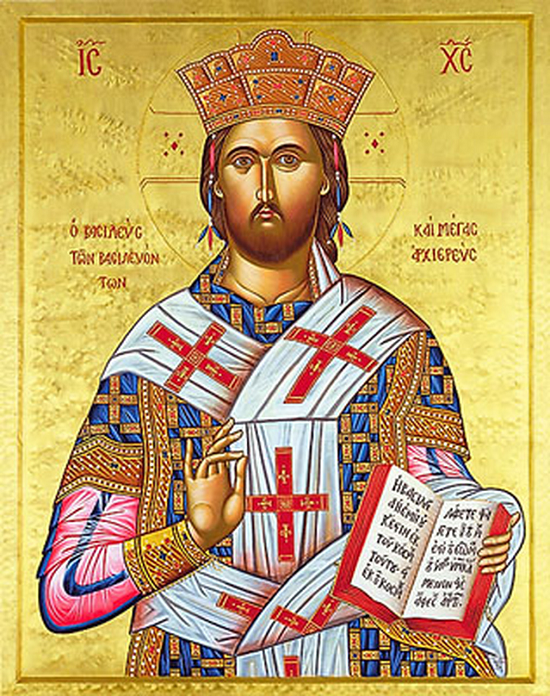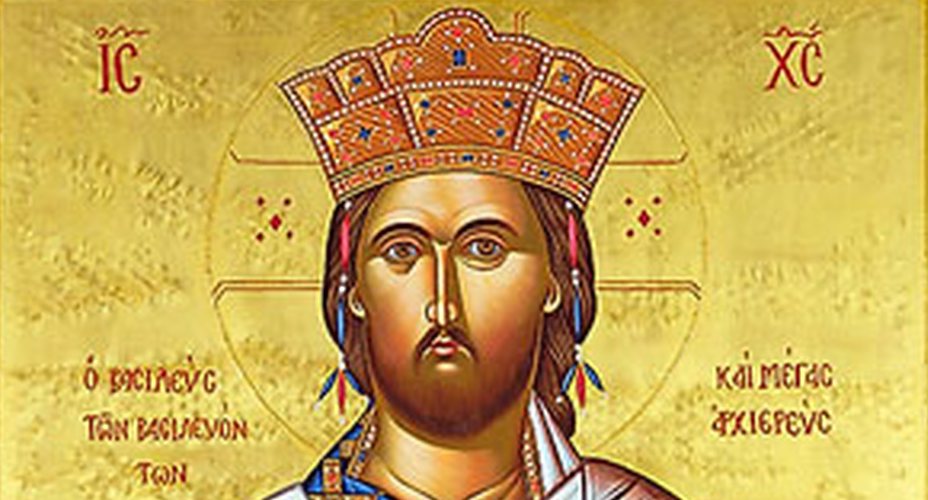The Christian Option
Christ the King Scripture Readings

When I was in school fifty years ago, one of the buzzwords in moral theology was the “fundamental option.” If we can grasp the fundamental option presented to us in today’s gospel, we’ll then have grasped what Christianity is all about. At the same time, we may come to appreciate how terribly the pseudo-Christians throughout history have distorted the very meaning of “Christian.” The worst offenders are those who proclaim that this—our nation, or any nation—is, or ever was a so-called “Christian nation.” Today’s gospel teaches us essentially everything we need to know about true Christianity.
Let’s start at the beginning. This text is addressed to Jesus’s disciples. That means us. It means people of faith who have already professed with Peter, “You are the Messiah, the Son of the living God” [Matthew 16:16], even without grasping the full meaning of the words. We can’t understand our way into faith. It’s faith that seeks understanding. The gospel passage we have in front of us today is a distillation of Jesus’s teachings, beginning with his assertion that he is the Son of Man spoken of in the prophets who will subsume the entirety of human history in himself. The passage refers to the Parousia we mentioned last week—that moment when Christ will be “all and in all.” [Colossians 3:11] Here, it’s described as a glorious kingdom united under the reign of the Messiah-king.
That king is presented to us as a royal judge, but not like secular judges who apply a set of laws to other people’s actions like the Pharisees did with the Law of Moses. He’s presented to us rather as a standard against which we get to measure our own attitudes and behaviors. It’s like if we were to draw a picture of a familiar scene, and then have it compared to the same scene as drawn by a famous artist. That artist wouldn’t be judging us or our work. Rather we’d be able to see what we might have accomplished had we had more time, attention, or skill. The judgment would come from the comparison itself. So will it be at the Parousia. The only surprises we’ll have will be how much more we could have done but didn’t. Then, as now, we can judge ourselves in light of our possibilities—and without any of our lame excuses.
This passage is Matthew’s version of Jesus’s final discourse. As such, it’s a weighty summary of all his teachings that have gone before. It serves as a basis for what we now refer to as the “Corporal Works of Mercy.” They are: to feed the hungry, to give drink to the thirsty, to clothe the naked, to give shelter to strangers, to care for the sick, to visit the imprisoned—and tradition has added a seventh one—to bury the dead. The pseudo-Christians, if they consider these at all, apparently think of them only as nice suggestions. Yet, once we come to realize that they constitute the foundations of the Kingdom of God and the essence of Christianity, we can begin to see that, without them, there is no Christianity.
You see, every other religion or spiritual practice I’m aware of is either all about God, or all about me, or all about God-and-me. Christianity, however, is uniquely about one another. While the pseudo-Christians are mainly focused on avoiding sin and not doing wrong, genuine Christianity focuses on doing good with love. This is so much so that the evildoers in the gospel are condemned not for anything they did, but entirely for the good they failed to do. There are two reasons why this focus on the Corporal Works of Mercy is foundational for Christianity.
The first, and most evident reason can be found in our gospel itself. Jesus, as Son of Man and lord of all, says, “Whatever you did for one of the least brothers of mine, you did for me.” This isn’t a metaphor. There’s a direct and fundamental connection between humankind and God. It’s the result and extension of the Incarnation. God-with-us didn’t vanish with the Resurrection and Ascension. It continues in the transformation of humankind by the power of the Holy Spirit. Therefore, if you can’t see God in one another, you can’t see God at all. And, if you don’t serve God in one another, you don’t serve God at all. Our service at the altar is meaningless if we don’t serve one another. Remember, “…if you bring your gift to the altar, and there recall that your brother has anything against you, leave your gift there at the altar, go first and be reconciled with your brother, and then come and offer your gift.” [Matthew 5:23-24] Why else do you think in our liturgy we offer each other a sign of peace before Communion? It’s because our Communion with God is mediated through our communion with one another. They’re inseparable: you can’t have one without the other.
If the first reason that the Corporal Works of Mercy are foundational for Christianity is that our relationship with God is dependent on our relationships with one another, then the second reason derives from the nature of spirituality itself. Spirituality is the outgrowth of that fundamental option I mentioned earlier. Every deliberate choice we make in life depends on our chosen value system. We act in accordance with what’s important to us. Where does this value system of ours come from? It’s the result of a fundamental option. Regardless of how rich or poor we may think we are, each of us has been enormously gifted, beginning with the gift of life. We just celebrated our Thanksgiving holiday. Everything we could think of to include in our giving thanks has been gifted to us or we’ve been given the wherewithal to obtain it. One of the ways we express our thanks is in the way we care for and nurture the gifts we’ve received. But, after that, what? Don’t we have a certain responsibility for what we do with them? How we use the gifts we’ve been given is an indication of what our fundamental option is. There are only two options, and they’re spelled out for us in today’s gospel: is our fundamental option the service of others, or is it the service of ourselves?
Here’s what’s wonderful about a fundamental option in the service of others: it’s remarkably forgiving. When we do wrong, and we go against our fundamental option, we know it. Yet, our realization of having done wrong can lead to deeper insight, greater experience, and healthy adjustments to avoid repeating it. It becomes possible for us to forgive ourselves for our faults and failings. Others, recognizing the fundamental goodness of our hearts, are also generally forgiving. And God, who knows our intentions better than even we ourselves, is always ready to forgive. Now look at the gospel. Where is the forgiveness for those whose fundamental option is self-serving? Fundamental options have consequences and, short of a profound, life-altering spiritual experience, those consequences are inevitable. Nothing but a fundamental option for loving service of others constitutes the essence of Christianity. Mere belief in God and in Jesus is not enough. Even trusting God in the hope of his care for us falls short. It’s love alone that saves us from futility and makes us citizens of God’s kingdom.
What could we say about a “Christian nation?” What would it look like? Such a nation would find the idea of any person being hungry or thirsty unthinkable. Such a nation could not tolerate knowing anyone—citizen or stranger—was without shelter or at least the basic necessities of life. No such nation would allow anyone to exist without the finest of health care. It would be intolerable to have anyone left abandoned to fend for themselves or warehoused as too inconvenient or too expensive to care for. Such a nation could not permit anyone to die alone or worse—to be put to death. No life would be valued any less than any other, regardless of the reason. That’s what it would look like if it were ever to exist.
You know, it’s forgivable that no one of us can turn our sociopolitical system into a Christian one. That’s beyond any of our power. What is unforgivable is for people who call themselves Christian to refuse food for the hungry, drink for the thirsty, welcome for the stranger, health care for the ill, comfort and care for the abandoned and imprisoned—and who fight and ridicule those who would provide these things for others. For, “…what you did not do for one of these least ones, you did not do for me.”
Get articles from H. Les Brown delivered to your email inbox.
